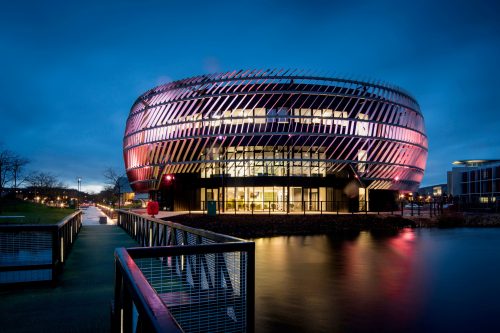UNIP at 10: New development plans promised

A decade ago, a large area of land in one of Nottingham’s suburbs was an empty reminder of what the city had lost.
The site off Triumph Road in Lenton had once been the home of Raleigh Bicycles – an industrial icon which employed thousands of people at its height in the 1950s. By the time it closed as the 21st century dawned, only a few hundred jobs were left.
But in 2008, work began on developing the site into something that has become a different kind of icon: the University of Nottingham Innovation Park (UNIP).
With tens of millions of pounds invested and hundreds of jobs created, UNIP is this month marking its 10th anniversary having transformed that site into one of the biggest concentrations in the Midlands of enterprise skills and research into the technologies of the future.
It is also a key focus for one of the most important contributions the University makes to the regional economy – a portfolio of services aimed at encouraging, training and growing the entrepreneurs of the future.
Dr Mark Tock, operations director at UNIP, says: “What we are doing here is very much the next chapter of Nottingham’s industrial evolution. There are very few places in the country where you can find the range and level of research expertise that we have here integrated with an entrepreneurial community.
“The University deserves enormous credit for this because it’s part of a deliberate and determined effort to make a positive difference to the world around us.
“UNIP has contributed to that through the inherent value of redeveloping an empty, brownfield site. It has helped to breathe new life into a place where people made their living, developed their skills and helped to make Nottingham what it is today.”
In simple numbers, UNIP has done that through activities which include setting up eight institutes researching technologies ranging from aerospace and advanced manufacturing to sustainable chemistry and the future of energy. Alongside them are university-owned enterprises, student entrepreneurs and tenants who want to be alongside a source of ideas and talent.
There are now more than 100 businesses at UNIP employing around 900 people, while its Ingenuity Centre houses a portfolio of services designed to equip student entrepreneurs with the skills to get their businesses off the ground, alongside offices and co-working space for a number of technology-based tenant businesses.
UNIP is also home to the University’s own commercialisation office, which helps turn research into viable businesses. Its director, Dr Susan Huxtable, said: “We are the largest research-intensive university in the East Midlands, so we produce more research outputs that are capable of commercialisation.
“To support those opportunities, we have a large technology transfer office that is staffed by experienced professionals.”
Through Nottingham Technology Ventures, which manages the portfolio of companies spun out of research, the University has enjoyed some notable successes in fields like healthcare, pharmaceuticals, manufacturing, software and agricultural technologies.
While these businesses have yielded some significant financial dividends for the University, money is not its only measure of success. Dr Andrew Naylor, NTV’s chief executive, explained: “We take a very holistic approach and one of the main indicators of success for us is the impact our investments have on society.
“A technology developed in a university laboratory won’t have an impact on society unless you have the tools to develop it in a way that enables you to take it out into the economy and the community. That is what we are here to help achieve.”
UNIP’s status as a centre for technology-driven enterprise has been enhanced by the presence of a number of external businesses who have chosen to locate on a site where technology and talent come together.
The most prominent is Romax Technology, which employs around half of its 250-strong team at its headquarters on UNIP.
Renowned globally for its expertise in software and services related to driveline technologies used in the automotive, aerospace, marine and wind energy sectors, Romax has collaborated with the University on several research projects, while employing a number of graduates.
Barry James, chief technology officer at Romax, said: “It’s been enormously helpful for the business to be so close to people you can collaborate with – for example, we are literally across the road from the Aerospace Technology Centre.
“Being on UNIP also means we’re part of a business community where there are a number of other technology ventures, and the site itself has a nice environment that sends out the right signals to people who visit us.”
UNIP is expected to announce shortly its vision for the next 10 years, with further development expected on the site.
DrTock concluded: “For the University, it was important that this site should develop in a way which meant it would continue to play a key part in the city’s economic future.
“The activities which take place here today mean that we’re having an impact on everything from what people eat to how we consume media, what we wear and how we’re cared for – on top of all the environmental, manufacturing and space technologies that we see being researched and developed here.
“We are also trying to encourage a new generation of entrepreneurs at UNIP – people who will perhaps develop the businesses that are going to sustain our economy into the future.”









